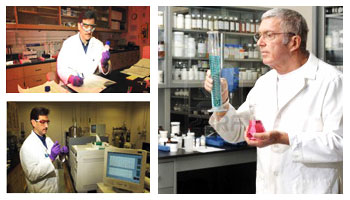 Chemists evaluating data in the laboratory
Chemists evaluating data in the laboratory
In chemistry, we perform many experiments for a particular purpose using certain instruments. In older days, the instruments need analyst to perform the experiment.
Whereas, now, we are provided with most advanced instruments which lessens the work of analyst to some extent and they directly give the results of performed experiment. Even then, we need to collect the data and see for the errors and acceptability of results by comparing with standard values. The process of collecting the data, finding out the errors and evaluating the results is collectively called as evaluation of data.
 Operational errors
Operational errors
- Improper weighing is an operational error
- Electronic thermometer is used to measure the temperature. In the above case, the actual temperature is 21°C but, the thermometer is showing 20.9°C which is an instrumental error.
Classification of errors:
The errors observed in experiments are classified as
determinate and indeterminate errors.
Determinate or systematic errors:
Determinate errors are the errors which can be avoided
or the extent of error can be determined. These include:
- Operational and personal errors:
These are the errors occurred because of the analyst's inattention. They can be avoided with proper care and experience of the analyst. These are physical in nature and arise if the technique is not properly followed. Few examples are:- Improper collection of sample or misuse of sample.
- Over washing of precipitates.
- Errors in noticing the burette reading.
- Ignition of precipitates at inappropriate temperatures.
- Using impure reagents.
- Improper cleaning of equipment.
- Using inadequately cooled crucibles before weighing etc.,
Personal errors include judging end points in visual titrations, inefficiency in predicting the color leads to slight overstepping of end point.
Errors of method:
These are due to the faults in implementing the experiments, skipping of the steps involved in experimental procedure by the analyst, choosing inappropriate method for analysis etc. For example, in titrimetric analysis, incomplete reactions and side reactions, difference between observed end point and the stoichiometric end point leads to errors.
- Instrumental and reagent errors:
They arise from uncalibrated weights, uncalibrated glassware, balances and other faulty equipment, using impure and expired reagents etc.